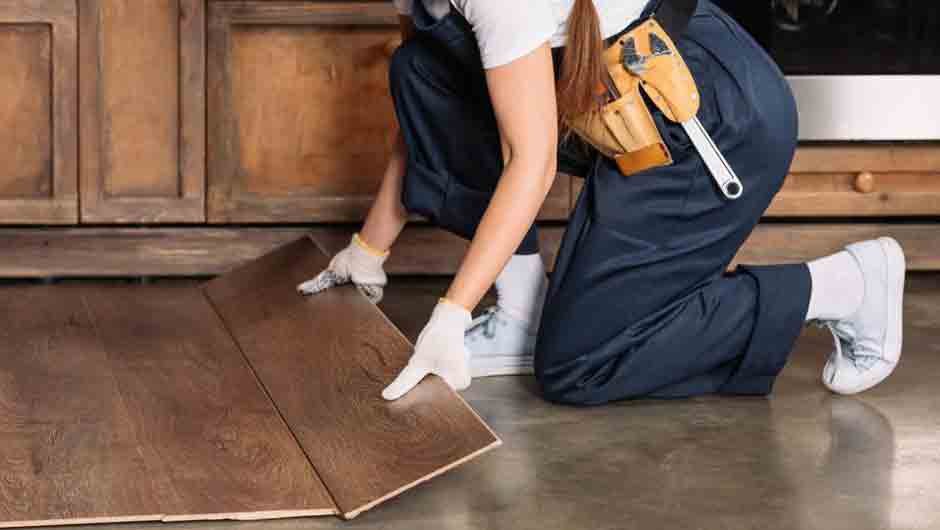Laminate vs. Vinyl Flooring: What to Choose

What is Laminate Flooring?
Laminate flooring is a type of floor covering that is made from several layers of synthetic material laminated together. It is designed to look like hardwood or stone and can be installed in any room in the home. Laminate is much less expensive than traditional hardwood or stone flooring, making it an attractive option for homeowners on a budget. Laminate flooring also offers many benefits that traditional wood and stone do not, such as being moisture-resistant, scratch-resistant, and very durable. In addition, laminate can be installed quickly over existing floors with minimal preparation work. With proper care and maintenance, laminate floors can last up to 25 years.
What is Vinyl Flooring?
Vinyl flooring is a popular and versatile option for any home. It is made from polyvinyl chloride (PVC) and is an affordable, durable, and low-maintenance alternative to traditional hardwood or stone floors. Vinyl flooring in Vancouver is becoming increasingly popular, and more and more homeowners are choosing it over other types of flooring. They are much easier to install since they typically come with an adhesive backing that can be easily applied over existing floors. Vinyl is water-resistant and very easy to clean, making it ideal for high-traffic areas such as kitchens or bathrooms.
Key Differences between Laminate and Vinyl Flooring
When deciding on new flooring for your home, it is important to understand the key differences between laminate and vinyl flooring. Laminate is a synthetic material made of layers of plastic that are fused together to create a durable and scratch-resistant surface. It is available in various colours and designs, making it perfect for any room. Laminate floors are more expensive than vinyl floors but are much easier to install, as they come with interlocking pieces that can simply be laid down over existing floors. Laminate flooring is also resistant to fading from UV rays, which makes it ideal for rooms with lots of natural light.
On the other hand, vinyl flooring is made from polyvinyl chloride (PVC) and comes in sheets or tiles that are easy to install with adhesive backing. Vinyl flooring is more affordable than laminate but does not provide the same level of scratch resistance or durability. Also, it requires regular cleaning and maintenance to keep its sheen intact. Both types can last up to 15 years with proper care and maintenance, depending on the quality and type chosen.
Water Resistance of Each Type of Flooring
The water resistance of laminate and vinyl flooring is an important factor for many homeowners. Laminate flooring is often made of composite materials and provides good water resistance, although it’s not entirely waterproof. It can be damaged if exposed to large amounts of water for extended periods. Vinyl flooring, on the other hand, is waterproof and highly resistant to moisture. It is also easy to clean and maintain due to its non-porous surface. Both types of flooring are suitable for humid conditions, however, vinyl will stand up better over time against long-term exposure to moisture.
High-Traffic Areas and the Best Type of Flooring for Them
High-traffic areas in your home can be hard on your floors, but with the right type of flooring, you can make sure they stay looking great for years to come. Vinyl plank flooring is an ideal choice for these areas due to its durability and water resistance. It’s also easy to clean and maintain, so dirt and grime won’t be an issue. Unlike laminate, vinyl plank won’t scratch or dent easily, so it’s well-suited for high-traffic areas like hallways and entryways. Additionally, vinyl plank comes in various colours and styles so you can find one that matches the rest of your home decor.
Durability & Maintenance Requirements for Each Type of Flooring
When it comes to flooring, both laminate and vinyl have their advantages. Laminate is typically more affordable, but vinyl has a longer lifespan. When it comes to durability, both types of flooring can hold up well in high-traffic areas, but vinyl tends to be the more resilient choice. Unlike laminate which can scratch or dent easily, vinyl plank is resistant to wear and tear so it’s better suited for hallways and entryways.
As far as maintenance requirements go, both types of flooring are quite easy to keep clean. For laminate, you should use a damp mop with mild detergent and avoid harsh chemicals that can cause discoloration or damage. You should use a dry microfiber cloth and vacuum regularly for the vinyl plank. Both types of flooring require proper protection from moisture as well as regular cleaning and waxing to maintain their shine and protect from scratches.
When choosing the right type of flooring for your home, consider factors like affordability, durability and maintenance requirements before making a decision.
Range of Styles Available for Each Type of Flooring
When it comes to flooring, both laminate and vinyl have a variety of styles to choose from. Laminate is available in a range of wood-look styles, including oak, cherry, and walnut. Vinyl plank offers a more contemporary look with options that mimic the appearance of ceramic tile or natural stone. Both types of flooring also come in a variety of colours, so you can find something that fits your personal style.
Laminate is often less expensive than vinyl plank and it’s easy to install as well. It can also be found in a wide range of thicknesses, so if you’re looking for something that’s more comfortable underfoot, you may want to go with laminate.
Vinyl plank tends to be slightly pricier than laminate but it offers a higher level of durability and water resistance which makes it ideal for bathrooms and kitchens. Plus, it’s usually easier to clean which makes it great for high-traffic areas like living rooms and family rooms.
Ultimately when selecting the best type of flooring for your home, consider factors like budget, style preference and maintenance requirements before making your final decision.
Advantages & Disadvantages of Both Types of Floorings
When comparing laminate and vinyl flooring, each has pros and cons. Laminate flooring is usually less expensive than vinyl plank and easier to install, but it can be prone to scratching if not properly cared for. Additionally, laminate may not be suitable for areas with high levels of moisture like bathrooms or kitchens due to its lack of water resistance.
Vinyl plank tends to be more expensive than laminate and can require more effort when it comes to installation, but it offers a higher level of durability and water resistance which makes it ideal for areas that are prone to moisture. Vinyl planks also come in a variety of styles so you can find something that fits your personal taste. However, vinyl planks may not be as comfortable underfoot compared to laminate due to their thinner construction.
Overall, both types of flooring offer a range of benefits depending on your needs and style preference. Consider factors like budget, maintenance requirements, and style before making your final decision.
Price Comparison Between Laminate & Vinyl Floors
When it comes to the cost of laminate and vinyl flooring, there are a few key factors to consider. Laminate is usually less expensive than vinyl plank and can be installed with relative ease. This makes it a great option for those who are on a tight budget. However, the quality of the material can vary significantly from one manufacturer to another, so make sure you check reviews before making your purchase.
On the other hand, vinyl plank tends to be more expensive than laminate but offers more durability and water resistance which makes it ideal for areas that are prone to moisture. Additionally, it comes in a variety of styles so you can find something that fits your personal taste. Installation costs may also be higher with this type of flooring due to the complex pattern designs.
Overall, both types of flooring offer different benefits depending on your needs and budget constraints. Be sure to weigh all factors before making your final decision.
Conclusion
When it comes to choosing between laminate and vinyl flooring, there is no one-size-fits-all answer. The price of laminate is usually less than that of vinyl plank, but you may have to sacrifice durability as a result. Vinyl plank is typically more expensive and requires more complicated installation, but it offers greater water resistance and a variety of design options. Ultimately, the decision should be based on your individual needs and budget constraints. Whichever option you choose, make sure it meets all your requirements for durability, style, and cost.



